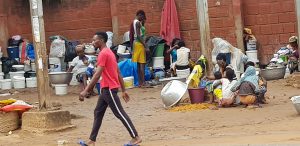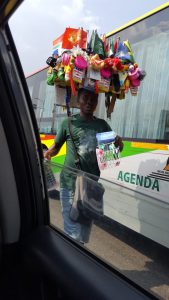Economy
Ghana is democratically largely established and acts as an important anchor of stability in West Africa. The country has been successfully pursuing a policy of good neighborhood and regional integration for decades. Ghana’s economic growth has been quite impressive in recent years. However, this has not resulted in sufficient jobs being created for the fast-growing young workforce.
The reason for this is that the economy in Ghana depends heavily on the export of a few products, such as gold, oil and cocoa. Fluctuating world market prices for these goods have a significant impact on the country’s economic situation. However, hardly any jobs are created in high-tech raw material sectors. Economic output in labor-intensive sectors such as agriculture and manufacturing has stagnated at a low level for decades.
In addition to oil and gas production and the export of cocoa and gold, the construction and consumer goods industries are also among the fastest-growing sectors. Great potential – which is currently underutilized – is also provided by agriculture.
Ghana is the second largest cocoa producer in the world after Côte d’Ivoire. Since 2010, other agricultural products, such as pineapple and mango, have also been exported to a significant extent – an important step towards reducing the economic dependency on individual export goods.
The economic challenges include a high inflation rate, high public debt and volatile foreign direct investment. An IMF program aims to implement state budget reforms, reduce subsidies and increase transparency.
Around 80 per cent of the Ghanaian population is employed in the informal sector and thus usually has neither formal vocational training nor social security.
http://www.bmz.de/de/laender_regionen/subsahara/ghana/index.jsp
The following is applicable to them all: Lack of social protection, low labor rights and lack of decent working conditions.
There are many people in Accra who either did not attend school or dropped out of school and do not see any career prospects. These people earn their money in Accra on the street. Some of the people work as so-called transport service provider on the street, i. they help other people to bring the purchased things to the car.

Others sell their goods by the road-side risking their lives from passing cars (travelling hawkers).

The term ‚informal sector‘ was first used in 1971 by anthropologist Keith Hart in a lecture on small urban entrepreneurs in Ghana. Hereby he described the v.a. a typical area of economy and society for developing countries, where traders, homeworkers, seasonal workers, day laborers, small family businesses, street sellers, shoeshineers, contract workers and simple service providers earn their living outside regulated structures and on the edge of legality and in income poverty, underemployment and vulnerability to risks are particularly widespread.
Even before Keith, the phenomenon described by him was observed and u.a. as ‚disorganized‘, ‚traditional‘, ‚marginal‘, ‚residual‘ or ‚household sector‘.
Source: Soziale Sicherung und informeller Sektor, Dissertation,S. 93-94, Markus Loewe, Fakultät für Wirtschafts- und Sozialwissenschaften der Ruprecht-Karls-Universität Heidelberg, November 2004
http://archiv.ub.uni-heidelberg.de/volltextserver/5661/1/Loewe_Soziale_Sicherung_und_informeller_Sektor_arabische_Welt.pdf
Germany is one of Ghana’s most important development partners. The aim of German-Ghanaian development cooperation is to promote viable, pro-poor, inclusive economic growth and thus bolster Ghana’s status as a middle-income country.
During government negotiations in October 2018, the German Federal Ministry for Economic Cooperation and Development (BMZ) committed new funds totalling 86.5 million euros to Ghana for bilateral development cooperation in 2018 and 2019.
The priority areas of cooperation are: Governance (decentralisation and improving public finances), Agriculture, Sustainable economic development (including vocational training). Under the framework of a reform partnership Germany is assisting Ghana in promoting renewable energies and energy efficiency. Cooperation with regard to waste management has also been agreed. The focus of this cooperation is on how to handle electronic waste.
Source:
http://www.bmz.de/en/countries_regions/subsahara/ghana/index.html


